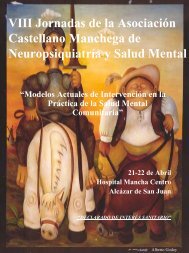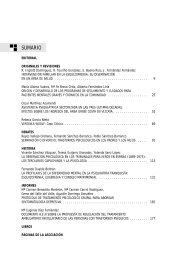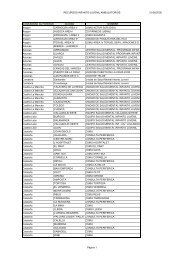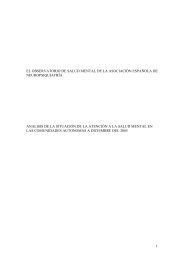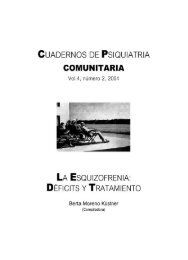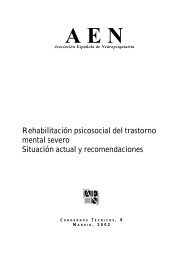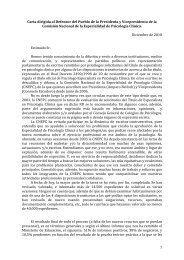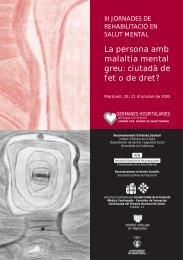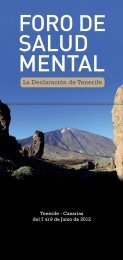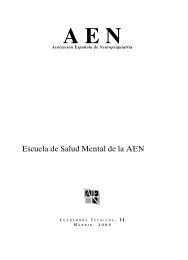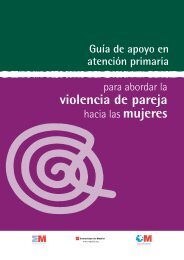SUMARIO - Asociación Española de Neuropsiquiatría
SUMARIO - Asociación Española de Neuropsiquiatría
SUMARIO - Asociación Española de Neuropsiquiatría
- No tags were found...
You also want an ePaper? Increase the reach of your titles
YUMPU automatically turns print PDFs into web optimized ePapers that Google loves.
REVISTA DE LA ASOCIACIÓN ESPAÑOLA DE NEUROPSIQUIATRÍA,Vol. XXV, nº 96, Octubre/Diciembre 2005, páginas 93-111(93)Antonio Sánchez-Barranco Ruiz, Pablo Sánchez-Barranco Vallejo, Fernando Sánchez-Barranco VallejoEL PSICOANÁLISIS ¿QUÉ TIPO DE CIENCIA ES?PSYCHOANALYSIS, WHAT KIND OF A SCIENCE IS IT?RESUMENEl mo<strong>de</strong>lo <strong>de</strong> ciencia que la psicologíaacadémica ha adoptado se atiene casiexclusivamente a criterios empírico-experimentales.Des<strong>de</strong> este bastión se hatratado <strong>de</strong> <strong>de</strong>rruir el saber psicoanalítico,arrojándolo a la cárcel <strong>de</strong> las pseudocienciaso <strong>de</strong> los mitos. En un momento <strong>de</strong>terminadose intentó acercar el psicoanálisisa tal mo<strong>de</strong>lo positivista, lo que trajoconsigo la pérdida <strong>de</strong> lo más esencial <strong>de</strong>lmismo. Sin embargo, <strong>de</strong>s<strong>de</strong> la década <strong>de</strong>los sesenta, algunos venimos insistiendoen ubicarlo en el marco <strong>de</strong> las cienciashistórico-hermenéuticas, don<strong>de</strong> la teoríay la práctica psicoanalíticas recuperan sutotal i<strong>de</strong>ntidad. En este trabajo, <strong>de</strong> formamuy sintética, se hace un recorrido <strong>de</strong>todo lo anterior, argumentando en favor<strong>de</strong> la tesis que sitúa al psicoanálisis<strong>de</strong>ntro <strong>de</strong> los saberes histórico-hermenéuticosvaliéndose tanto <strong>de</strong> estrategiasinductivas como <strong>de</strong>ductivas.Palabras claves: Psicoanálisis, Ciencia,Pseudociencia, Epistemología,Histórica, Hermenéutica, Deductivo,Inductivo.ABSTRACTThe mo<strong>de</strong>l of scientific knowledgethat the aca<strong>de</strong>mic Psychology hadadopted follows, mainly, empirical an<strong>de</strong>xperimental criteria. From this standpoint,thus, there have been numerousattempts to <strong>de</strong>value the psychoanalyticbody of knowledge by being <strong>de</strong>picted aspseudoscientific or just a myth. Consequently,the psychoanalytic communityma<strong>de</strong> some efforts to drive Psychoanalysiscloser to Positivism, which had as a resultthe loss of its essence. However, since the60’s, some psychoanalytic authors haveinsisted on including the Psychoanalysisas a part of the Historical-Hermeneuticknowledge, in or<strong>de</strong>r for its theory andpractice to recover all their i<strong>de</strong>ntity. Inour paper, we have briefly reviewed theabove i<strong>de</strong>as, supporting the thesis that,by means of <strong>de</strong>ductive and inductive strategies,Psychoanalysis should be placedinto the Historical and Hermeutical boyof knowledge.Keywords: Psychoanalysis, Science,Pseudoscience, Epistemology, Historical,Hemeneutical, Deductive, Inductive.




